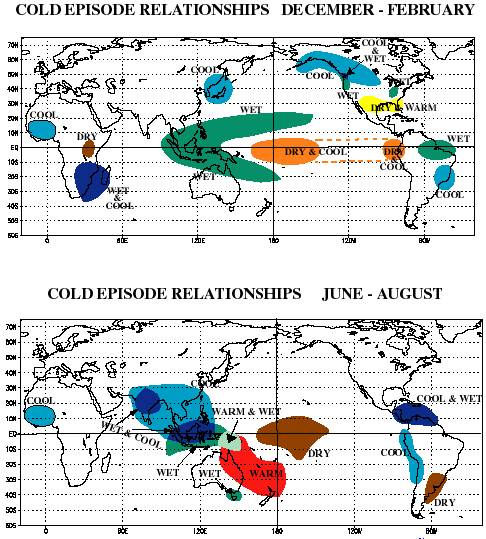Often the focus each winter is the state of the El Nino/La Nina Southern Oscillation (ENSO). Many of you know my annoyance at mainstream forecasts which display a map like the one below and walk away believing that the public has been served. Ladies and Gentlemen, it is often stated "The Devil is in the details".
 Stereotypical La Nina Relationships Source: Wikimedia Commons |
Here is a detail, which if it becomes true will make a huge difference between a stereotypical mild and dry winter for Central NC and VA and something much different. When La Nina's effects on global circulation reach a bottom in mid or late season then the "boring" winter usually wins. What happens if the bottom is reached during the preceding autumn? Did this La Nina episode just do that?
 Source: Earth Science Research Laboratory |
Extreme winter events in the Southern Hemisphere is a cause of concern. There was the massive cold wave which swept South America. The cold devastated fish populations, livestock, and killed people. Snow and sleet was observed in tropical regions and the cold actually crossed the equator ! Recently spring blizzards raged in New Zealand for six days. Over 350,000 lambs were estimated to have been killed by the weather.
Another variable is the ongoing but lower level volcano activity in the high latitudes. Such activity will certainly reinforce the propensity for blocking patterns which has caused global grief this year in the form of prolonged extreme weather. If the Katla volcano blows its lid in Iceland then the risk of dangerous winter cold engulfing much the the US and Western Europe would rise significantly.
How do I see Winter 2010-11 based on an Autumn bottom of La Nina?
- Overall average temperature a little colder than neutral BUT getting there by wild swings in temperatures.
- Last year's cold was persistent and costly. 2010-11 should include shorter periods of extreme cold. It would not surprise me if Central VA and NC experience periods of unbelievable cold with lows below 15.
- There will be breaks in the winter action. Keep some short-sleeved shirts handy. Perhaps even some time to get a January tan! (70's) . But unlike last winter we will get some real warm spells.
- Not as much persistent snow in VA. BUT... If one wants to roll the dice for blockbuster winter events then this is a good year to do it. IF the weakening La Nina thesis works then there will be at least one period where arctic cold and the southern jet stream can produce a memorable or historic period of weather. 1995-1996 and 1999-2000 had seasons which appear similar to this one. I am not sure how 1935-36 might correlate. 35-36 was a snow blockbuster for our region and featured a persistent negative NAO. That being said ... snow in the Raleigh area is episodic, therefore cannot be predicted using statistical averages. Our propensity for sleet and freezing rain can conceal bad winters because we do not count all frozen precipitation.
No comments:
Post a Comment